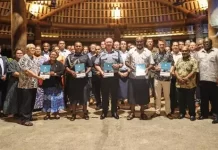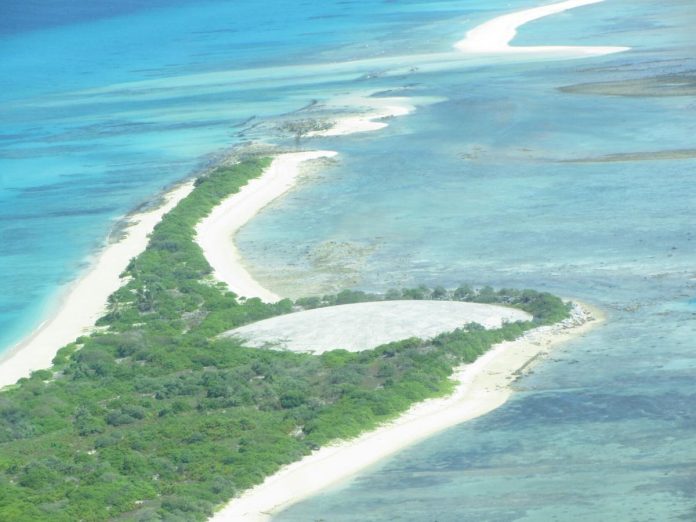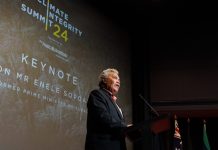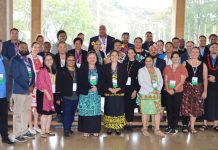United States congressional leaders have ramped up pressure on the White House to elevate focus on negotiations over Compacts of Free Association with the Marshall Islands, Federated States of Micronesia and Palau — and to resolve all outstanding issues in the U.S nuclear test legacy with the Marshall Islands.
Ten Congress members signed a letter earlier this month to Jack Sullivan, President Joe Biden’s national security advisor at the White House, “to express our deep concerns over stalled negotiations” with the freely associated states, raising the specter of China’s increasing influence in the region.
Last month, Marshall Islands Foreign Minister Casten Nemra told a U.S congressional hearing on the Marshall Islands there had been no formal negotiations this year and none were scheduled, though he anticipated a session in the near future. A front-page article last week in Palau’s Tia Belau newspaper reported an interview with President Surangel Whipps Jr. saying there was little progress in negotiations with the U.S. The article was titled “Palau-U. S compact negotiations not moving forward — Whipps.”
Last week, Interior Department Deputy Assistant Secretary Keone Nakoa met with multiple Hawaii officials related to Compact issues. Together with Ambassador Karen Stewart, the former U.S Ambassador to Marshall Islands, they held the first face-to-face meeting with FSM Chief Negotiator Leo Falcam Jr.
The primary concern of an increasing number of Congressional leaders in both parties is that these important negotiations with the Freely Associated States (FAS) are being managed by low-level representatives of the U.S government who do not have authority to address negotiating issues that need to be handled in the Compact talks.
The U.S Congress people said the FAS “are crucial to United States’ national security in the Pacific” and quoted Biden’s Secretary of State Antony Blinken, who described the Compacts as the “cornerstone” of U.S-FAS relationships.
“It is distressing that these negotiations do not appear to be a priority — there have been no formal meetings since this Administration began — even as our international focus continues shifting to the Indo-Pacific,” said the 05 November letter to Sullivan.
It was signed by eight Democrats and two Republicans. Democrats Dina Titus (Nevada), Ed Case (Hawaii), Michael FQ San Nicolas (Guam), Gregorio Kilili Camacho Sablan (Northern Marianas), Katie Porter (California), Kaiali’i Kahele (Hawaii), Kathy Manning (North Carolina), and Ted Lieu (California); and Republicans Brian Fitzpatrick (Pennsylvania) and Aumua Amata Coleman Radewagen (American Samoa).
This follows a letter that Reps Raul Grijalva, the chairman of the Committee on Natural Resources, and Katie Porter, the chair of this committee’s Subcommittee on Oversight and Investigations, sent in early September to Kurt Campbell, the Indo-Pacific coordinator at the National Security Council in the White House, calling for a complete change in tack in order to properly address the many issues in the Compact negotiations. They received only an acknowledgement of their letter, but no substantive reply from Campbell, according to Porter’s office.
“Over the last six months Congress has repeatedly written members of the Administration to express our concerns over talks and urge the presidential designation of a lead negotiator on the National Security Council (NSC),” said the 10 Congress members. “A presidential representative with an NSC directive and a small staff could coordinate the 14 agencies with major programs in the FAS and ensure that negotiations reflect the values and priorities of the Biden Administration.”
They said both parties in Congress agree on “the need for a new approach.”
The letter criticises the current approach of the U.S administration in negotiations with the FAS, and says a Department of Energy official “misrepresented U.S bilateral agreements with the Marshall Islands” related to Enewetak Atoll’s nuclear waste storage facility at Runit Dome during testimony last month to the Congress.
“In view of these issues, we again reiterate the need for a presidentially appointed lead (Compact) negotiator on the NSC,” the 10 Congress members said. “This individual should ensure that unfulfilled Compact law commitments are honored, and that the U.S is not cutting aid to our strategic partners with maritime security in the Pacific hanging in the balance. Additionally, this individual should have the mandate to see that legacy issues related to U.S nuclear testing in the region are appropriately resolved, including proper environmental protections, clean up, health benefits, and monetary compensation for victims and their descendants.
“The current approach to (Compact) talks has only put the U.S in a weaker position, and while we know the FAS would prefer to continue their special relationship with the United States, China is all too ready to step in and provide the desperately needed infrastructure and climate resiliency investment that is sought by these long-time partners.
SOURCE: MARIANAS VARIETY/PACNEWS














